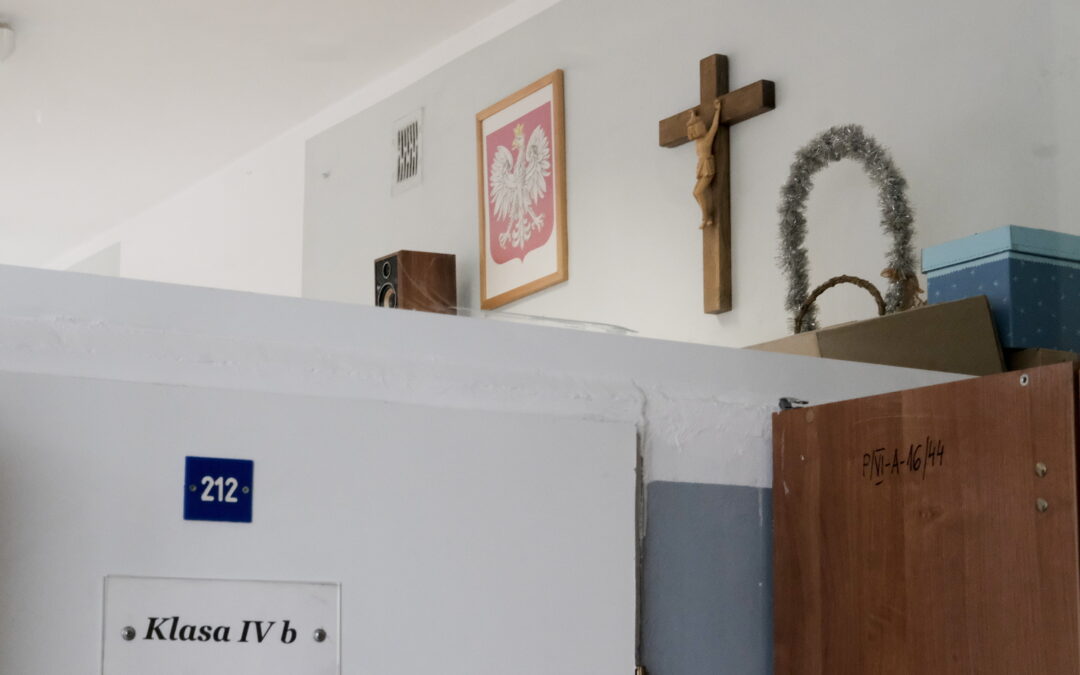Keep our news free from ads and paywalls by making a donation to support our work!

Notes from Poland is run by a small editorial team and is published by an independent, non-profit foundation that is funded through donations from our readers. We cannot do what we do without your support.
The Polish government has enacted a regulation halving the number of state-funded religion classes in public schools to one hour per week, starting on 1 September 2025, despite opposition from the Catholic church.
The move also introduces changes to the scheduling of religion classes – which teach Catholic catechism and are currently optional but taken by most pupils – requiring them to be held during the first or last lesson of the day if not all pupils decide to participate.
The education ministry said the regulation – signed by education minister Barbara Nowacka on Friday – will ensure greater flexibility for school timetables, especially in cases where participation in religion lessons is limited.
✍ Rozporządzenie dotyczące 1 lekcji religii zostało podpisane. pic.twitter.com/P7bOlTzQ3Z
— Ministerstwo Edukacji Narodowej (@MEN_GOVPL) January 17, 2025
The church, however, condemned the regulation, calling it an “unlawful act” and arguing that the required agreement with religious associations has not yet been reached.
Nowacka first proposed reducing the number of catechism classes in December 2023, on the same day the government she is part of was sworn in and replaced the former ruling national-conservative Law and Justice (PiS) party.
She argued that the classes, funded by the state but with teachers and curriculums chosen by the Catholic church, are costly and that two lessons per week are “excessive,” given that it is more than pupils have for some other academic subjects.
From the beginning, her proposal was met with opposition from the church, which questioned whether the reforms aligned with the concordat Poland signed with the Vatican in 1993, which governs the role of religion in public life.
Nowacka, however, dismissed claims of a breach of that treaty, stating that the changes pertain to the organisation of religious teaching rather than its existence.
In an interview with TVN24 in October, she also said that the new rule “does not prevent the church from taking responsibility” and paying for additional hours. Those lessons “can be carried out in whatever place the church wants”, she added, such as in a classroom “lent free of charge by a school, or in a [church-owned] catechism room”.
The archbishop of Warsaw has called for school religion classes – which teach Catholic catechism and are currently optional – to be made compulsory.
"Without knowledge of Christianity, it will be difficult for young people to understand the modern world” https://t.co/MSjveirqPr
— Notes from Poland 🇵🇱 (@notesfrompoland) October 4, 2024
Senior church officials reiterated their opposition to the changes over the weekend, arguing that they “restrict the right of religious parents to raise their children in accordance with their beliefs”, as well as “the right of students themselves to systemic support in ‘the development towards full maturity’, including the spiritual sphere”.
The Polish Bishops’ Conference (KEP), the central organ of the Catholic church in Poland, emphasised that the regulation is “an unlawful act, as the agreement required by law [between the government and]…the Catholic church and the other religious associations concerned has not been reached”.
“We expect the education ministry to refrain from taking confrontational actions against religious believers,” the KEP said in a statement.
Oczekujemy, że MEN powróci do stosowania standardów państwa prawa i odstąpi od podejmowania działań konfrontacyjnych wobec osób wierzących, które są pełnoprawnymi obywatelami Rzeczypospolitej Polskiej – czytamy w Komunikacie Prezydium KEP.https://t.co/zGOZNibRoD pic.twitter.com/iZDu7InyRg
— EpiskopatNews (@EpiskopatNews) January 19, 2025
The newly signed regulation follows another change introduced by the ministry last year, which also angered the church. It allowed schools to create religion classes composed of pupils from different year groups if fewer then seven children from one cohort opted to attend.
Up until then, in such cases, a separate class was held for each cohort.
In response to the change, the church referred the case to the Supreme Court, which redirected it to the Constitutional Court (TK), widely seen as under the influence of PiS, which also has close ties with the Catholic church.
The constitutional court has ordered a halt to planned changes by the government to the organisation of school religion classes.
The measure was requested by Christian churches and is in place until the court issues a ruling on the legality of the changes https://t.co/ASP8TLIbtb
— Notes from Poland 🇵🇱 (@notesfrompoland) August 30, 2024
The TK issued an interim order suspending the implementation of the changes, but it was ignored by the government, as it did not recognise the then-TK president and some other TK judges as legitimate.
Some Polish cities, including Wrocław and Częstochowa, have called in the past for an end to municipal funding for Catholic catechism classes in schools amid falling attendance.
The decline in the number of pupils attending religion classes follows a decrease in the number of Poles identifying as Catholics overall. The latest national census data showed that in 2021, 71% of Poles identified as Catholics, down from 88% a decade earlier.

Notes from Poland is run by a small editorial team and published by an independent, non-profit foundation that is funded through donations from our readers. We cannot do what we do without your support.
Main image credit: Piotr Skornicki / Agencja Wyborcza.pl

Alicja Ptak is deputy editor-in-chief of Notes from Poland and a multimedia journalist. She has written for Clean Energy Wire and The Times, and she hosts her own podcast, The Warsaw Wire, on Poland’s economy and energy sector. She previously worked for Reuters.



















